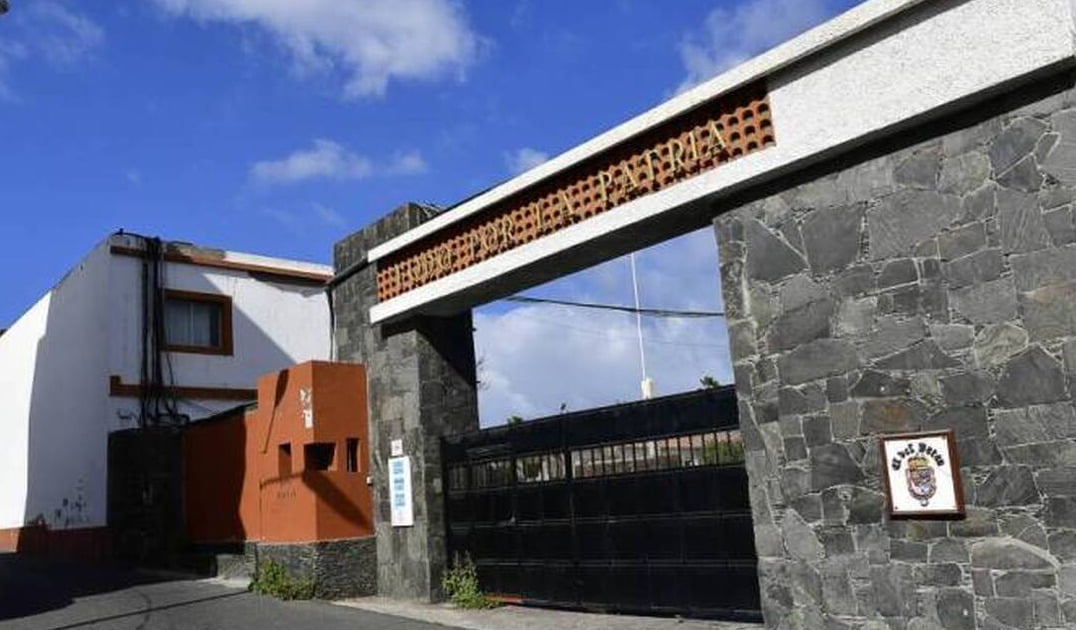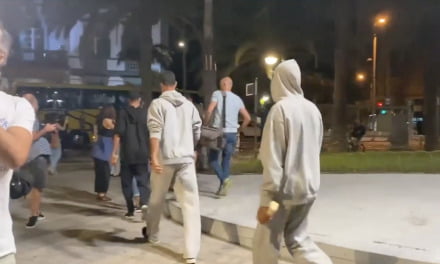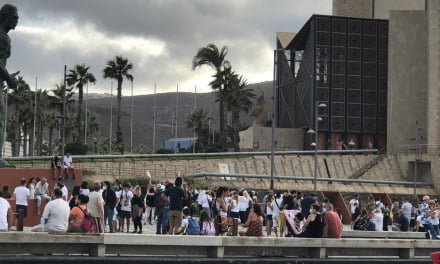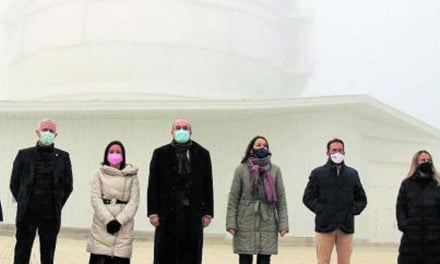Spain’s Ministry of Defense has this weekend offered a fourth facility to help accommodate migrants who have been arriving en masse to the islands by boat over the last few weeks and months, so as to try to ease the pressure on local infrastructure following a huge increase in people trafficking, and migrants attempting the crossing, on what is known as the Atlantic Ocean Canary Route, widely considered one of the most dangerous migratory routes in the world. The ministry has now made available the buildings of the Canarias 50 Regiment in La Isleta, Las Palmas de Gran Canaria.
The department headed by Defense Minister Margarita Robles have offered the Ministry of Migration “immediate use, through a temporary arrangement, without any compensation, authorisation, to help alleviate Immigration Needs”.
“At the same time, work is progressing to resolve the issue legally and transfer full control of the facilities to the Ministry of Migration,” the ministry reported this Saturday.
The old headquarters of the Canarias 50 Infantry Regiment is located in the neighborhood of La Isleta, in the capital of Gran Canaria, just outside the current Canarias XVI Brigade base and will be used to accommodate migrants.
The Defense Ministry has already made three other facilities available over recent weeks to help accommodate migrants arriving on the Canary Islands, the Las Canteras barracks, in La Laguna (Tenerife), and El Matorral, in Puerto del Rosario (Fuerteventura), along with the old Foreigner Internment Centre in Barranco Seco, Gran Canaria, which fell into disuse in 2012 and had been closed back in 2018.
 So far this year, 11,667 migrants have arrived or been rescued in waters near the Canary Islands in 431 boats, eight times more than last year, according to official figures. With two months to go to the end of the year, that number gives 2020 the third highest recorded number of irregular migrant arrivals by sea to the Canary Islands in history, after 2006 (31,678) and 2007 (12,478), with every possibility that the numbers will continue to climb.
So far this year, 11,667 migrants have arrived or been rescued in waters near the Canary Islands in 431 boats, eight times more than last year, according to official figures. With two months to go to the end of the year, that number gives 2020 the third highest recorded number of irregular migrant arrivals by sea to the Canary Islands in history, after 2006 (31,678) and 2007 (12,478), with every possibility that the numbers will continue to climb.
Editor’s comments:
The 2020 migration crisis follows stark warnings from refugee and other migrant agencies over the past year, that people trafficking was likely to increase here, as a consequence of work over the last 2-3 years by the European Frontiers agency Frontex, who have been largely successful in stemming the massive migrant flows, which came to light back in 2015-16, crossing the mediterranean. Having successfully blocked this route from northern Africa into Southern Europe, traffickers and the migrants desperate to start a new life, escape poverty, war, oppression, climate change and a range of other issues, having few if any official migration routes open to them, have found the much more dangerous Canary Route to be, once again, more attractive than the alternatives.
It is known that at least 800 people have died this year attempting the journey, whether simply by running out of food or fuel and starving to death, miscalculating sea currents and drifting out into open ocean, having their vessels overturned by rough seas and drowning or more starkly, through engines exploding and fuel tanks catching fire, burning the migrants aboard alive, as happened just two weeks ago. These are just the people, however, that we know of. There are likely to be many others who have simply disappeared without trace.
Europeans, legitimately resident on the islands and elsewhere, rarely grasp the desperation involved in choosing so dangerous a course of action. Xenophobia and indeed simple racism repeatedly rears its ugly head in comments from white westerners. Fear, ignorance and anger often lead to snap generalisations and abhorrent suggestions that rarely take into account the individual hardships involved in choosing to make so difficult a journey. It is easy from a position of privilege to pass judgement on those seeking access to Europe, and to ignore individual stories or avoid any historical context the situations migrants try to escape.
Even in the face of a more than 90% reduction in tourism, the covid19 health crisis and associated ongoing economic crash, there are many who would prefer hotels and tourist apartments to remain empty rather than accommodate anyone arriving on these shores in hope of a better life and onward travel to mainland Spain. More than 4,000 migrants have been temporarily accommodated in otherwise empty tourist accommodations over recent months, which ironically has allowed many of these businesses to stay afloat despite the absence of visiting tourists. Still many of those who have little or no connection to these businesses, often European migrants themselves, express mostly irrational fear and anger over a situation that nobody wants, but at least temporarily serves the interests of those who find themselves in the thick of it.
A few hundred people marched through the streets of Arguineguín, on Gran Canaria’s usually touristed south coast, last Saturday, demanding “solutions”, joined by a not-so-camera-shy local mayor who claims to “only have the humanitarian interests of the migrants” at heart, however marching with her were many racists and xenophobes demanding “more tourists, less parasites” and an “end to the invasion”; claiming to have been abandoned by Spain in the face of mounting migratory pressures leading to security fears, though few if any credible threats to security have actually yet been recorded, those who took part in the march on Saturday expressed fear and frustration that hundreds of African migrants camped at their port, awaiting coronavirus test results, could harm their image as a tourist destination. Though they offered few potential solutions beyond taking them elsewhere.
Meanwhile, regardless of the migrants, the tourism industry is on its knees and unlikely to recover any time soon. This has left many hoteliers with a clear choice between staying open and being paid, through EU emergency funds to temporarily accommodate migrants in desperate and urgent need, or simply shutting their doors and going out of business while they wait for the coronavirus pandemic to pass.














Thank you for your level headed, sympathetic view on the plight of the migrants that have recently arrived on Gran Canaria. These people should be treated with more respect, if only for their guts and determination to make a better life for themselves. Who are we to sit in our comfortable homes judging people less fortunate than ourselves. To have made that terrifying journey only to be met by ignorance and hostility must be heart breaking. I am pretty sure if roles were reversed not many of us would have the courage to even attempt to embark on a journey like that.
Thank you for your kindness. People are often scared of what they do not understand, and feel frustrated when “strangers” appear to get more help than the people living here do. But of course this is most often pretty irrational. The Spanish Government has handled the whole thing pretty badly, but we agree, in general people need to be quicker to kindness and slower to make judgements on others who are clearly much worse off than they are.